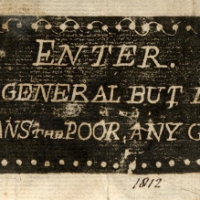How to Grade Assignments in a Library
At this very moment, legions of students are busily writing papers and studying for their final exams. Indeed, for the end of the semester is upon us! These students will soon be breathing a massive (and audible) collective sigh of relief as they submit their final assignments. But even as these students promise themselves not to procrastinate as much next semester, another set of individuals will sigh (also audibly) in anticipatory exhaustion as they recognize how much more work they still have to do before the semester ends. This latter group being none other than those individuals who must now grade all of those aforementioned students’ assignments.
Many a librarian is familiar with this time of year; it marks the moment when the reading rooms go from being occupied by students researching and writing papers to professors (and teaching assistants) grading all of those papers. And thus, in the spirit of being helpful, here are some useful tips on how best to grade while working in a library…
I. You should come into the library with your grading strategy already in mind. This is not to say that there is only one acceptable grading system that you can use whilst in the library, but for the sake of your own limited time it may be advisable for you to come in with some kind of plan and with a commitment to seeing that plan through to completion. Alas, more focused graders than you have found themselves hopelessly distracted while in the library and the reason was that they allowed their focus to wander as they contemplated exactly how they were going to go about grading. If you find yourself thinking: “maybe I’ll jus take half an hour to see if the library has that book I was looking for,” or “since I’m here I should really ask to see that archival collection,” or “it’s been a long time since I’ve looked at microfilm of an obscure 19th century newspaper from Berlin,” or “I should really go say hello to my colleague who is sitting on the other side of the room,” or “I wonder what the librarian at the reference desk thinks of the latest pop culture phenomenon that everybody seems to be talking about” – then stop! Please know that such thoughts are a sure way to find yourself feeling flabbergasted when the librarian announces “we’ll be closing in fifteen minutes” – for you will have unwittingly lost the day you intended to spend grading doing something else. Now the pursuit of knowledge is a wonderful thing to chase after in a library, but if you came there to grade you owe it to yourself (and, one supposes, to your students) to actually do the grading. Do not allow yourself to be distracted!
II. Wrongly or rightly, libraries have a reputation for being rather quiet places. There is, after all, a reason why the stereotype of the shushing librarian persists in the popular imagination. Therefore it is important for you to pause for some critical introspection before you come to the library to grade student assignments. You must carefully ask yourself: do I make strange sounds while I am grading? It may well be that you make these sounds without realizing you are doing so, in which case it may be wise for you to ask those who have been in your presence whilst you have graded to find out if you make any strange sounds while you are grading. Please be aware that if you are making any of the following sounds while grading in a library it may result in a librarian politely asking you to keep the volume down. Sounds and phrases to refrain from making include (but are not limited to):
- Loud groans
- Going “Huh?” audibly
- Going “Huh!” audibly
- Loud sighs
- Single mirthless laughs
- Forlorn whimpers
- Disappointed guffaws
- Saying “Oh my god”
- Talking on the telephone to your department chair
- Going “Hmmmm”
- Shouting “why god?”
- Crying
- The incessant “clacking” of the typewriter you brought along for some reason
- Humming pop songs
- Saying “What the?”
- Audibly smacking yourself in the forehead
- Talking on the telephone with one of your TAs
- Saying “No” over and over again
- Making a ruckus by loudly tearing the things you’re grading to shreds
- Proudly declaring “well done!”
- Announcing the grade you are giving to each paper aloud
- Asking, to nobody in particular, “what was I thinking assigning this?”
III. Note: if you are an architect, or structural engineer, and have come to calculate the grade of the hill leading up to the library please inform the staff without delay. They will be able to assist you further in picking ideal spots to set your equipment. With so much grading going on it can be easy for the librarians to lose track of the particular types of grading that need to occur. Obviously, if you are a professional who regularly calculates the slope of things you will know the relevant formula, but just in case – remember, it’s “rise over run.” You are welcome.
IV. When a patron asks to see archival material, the librarian will generally give them a short spiel before actually allowing them to have the material. Included in this short instructional speech will usually be some sort of comment along the lines of “leave everything in the original order, don’t remove anything, and don’t add anything.” In other words, if you were planning on secretly inserting the items you brought to grade into an archival collection and then fleeing the library…well…please, do not do this. Really. It will only create confusion down the line when somebody else goes through that archival collection and approaches the reference desk to inquire why there are math tests or essays from a comparative literature class in a folder of correspondence in an archival collection belonging to a criminally forgotten composer? If you don’t want to grade your students’ assignments, you are free to randomly assign grades. And if you don’t want to keep your students’ assignments after you have graded them, that is your business, but please refrain from adding this material to the library’s collection. Unless, that is you are working in a library that features an archival collection of papers that have been graded – if that is the case you should check with a member of the library’s staff to determine the proper donation procedure.
V. In recent years many professors have begun using dice to enable them to grade with greater speed. Generally this grading strategy entails a professor rolling a six-sided-die, on a roll of a 6 the assignment gets an A, on a roll of a 5 the student gets an A-, on a roll of a 2, 3, or 4 the student gets a B, and on the roll of a 1 the student gets an F. While there is certainly a larger argument to be had about the ethics of such a random method of grading (to say nothing about a larger argument about the ethics of grades [as such]) it should be noted that this is not a method of grading that lends itself well to libraries. The constant clattering of the die is loud and distracting to other patrons, and the die is quite likely to wind up falling off the desk and landing in another patron’s work area or by another patron’s foot. Such occurrences are bothersome to the other patrons in the reading room, and they also raise the question of whether or not this means that the die needs to be re-rolled. Furthermore, there is always the chance that two professors will be using this method of grading at the same time and their dice might get mixed up when both dice wind up on the floor at the same time. Which die is which? Which student gets which grade? It is not the place of this post to expound upon the morality of this method of grading; however, if you grade by rolling dice, please refrain from doing so in the library. Also, for those of you who are considering adopting this grading tactic, the library does not necessarily lend six sided dice. Please note – though the six-sided-die was singled out in the preceding text, this sentiment towards grading with dice applies to all variations of dice regardless of how many sides a dice may have.
VI. Of course, not all classes feature assignments that students type themselves or frantically scrawl within blue booklets. In many cases the ultimate examination or assignment will take the form of some kind of discussion (common in the case of language exams), formal presentation with an accompanying power point presentation, poster presentation, or some manner of recital. In such cases it is common for the professor (or whoever is grading) to observe and grade the assignment as it is being presented/performed. Indeed, many a student can relate a tale of their own anxiety as they attempt to read the facial ticks of their professor for a sign of how they did on such assignments. Please note, the library is aware of the fact that it may be a constant source of frustration to book rooms at your university but that does not mean that the reading room is available for the student presentations that you need to grade as they occur. In short: please do not tell your students that they will be staging their interpretive dance, experimental poetry recitation, or bassoon performance in the library’s reading room. It’s not that the librarians aren’t keen to see the dance, take in the poem, or listen to the bassoon – but the other patrons (some of whom are trying to grade their own students’ assignments) might complain.
VII. Much to the consternation of the library’s staff, everything within the library is in fact slowly coming apart. Time acts on everything. Everything degrades. The books, the microfilm, the computers, the newspapers, the archival material, even the library’s staff and the patrons themselves are gradually breaking apart. It’s all slowly becoming kipple. Granted, usually this process is so slow that nobody even realizes it is happening. While at other times, such as when a patron is looking at a stack of old crumbling newspapers, the evidence is obvious in the trail of paper fragments that are left behind on the desk. Yes, everything in the library is degrading – and though the library may be carefully climate controlled to minimize this occurrence, even the most persnickety preservationist will confess that only so much can be done to fight against the slow impact of time. And you who sits in the library grading your student’s assignments, you shall leave the library older than you were when you entered it, as your body imperceptibly bows in obedience before the winnowing of time. Of course, there are some who consider “degrading” to simply be a term for giving students a “D grade” to spare them from failing the class. While, on another level, there are those who consider the very concept of assigning grades to intellectual output to be degrading, but that is a debate for another time.
More Advice of Questionable Merit!
How to Read a Large Book While Riding Crowded Public Transit












I usually cannot grade in the library because I need several stiff drinks to swim through the steaming pile of student essays. Perhaps I should invest in a flask.
On another note, it would be interesting to read your thoughts on this: https://lareviewofbooks.org/article/neoliberal-tools-archives-political-history-digital-humanities/
Pingback: How to make the most of your trip to the archive | LibrarianShipwreck
Pingback: How to Reserve a Seat in a Library | LibrarianShipwreck